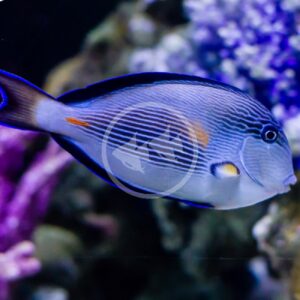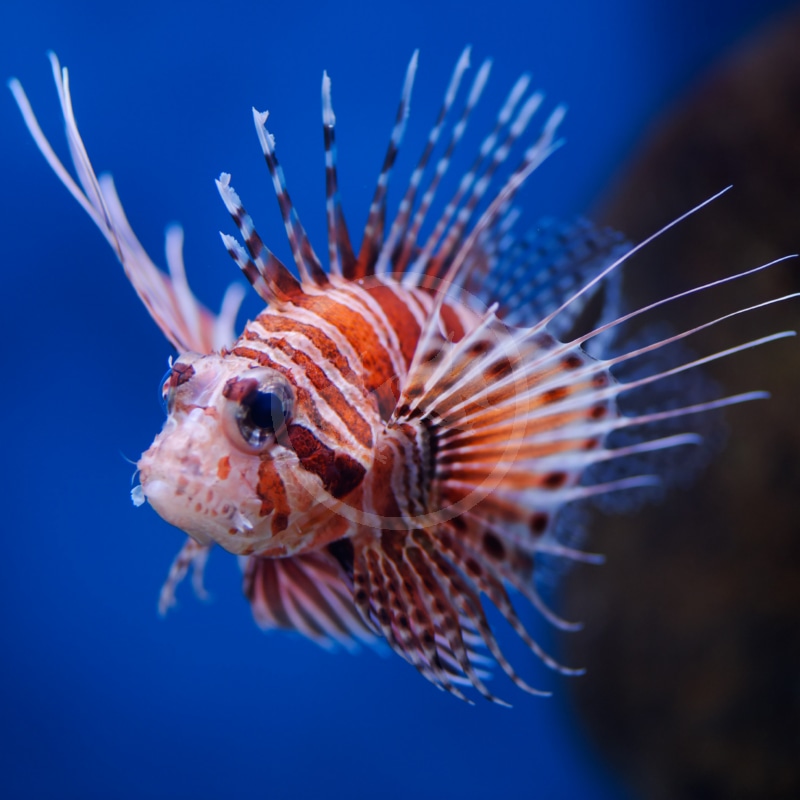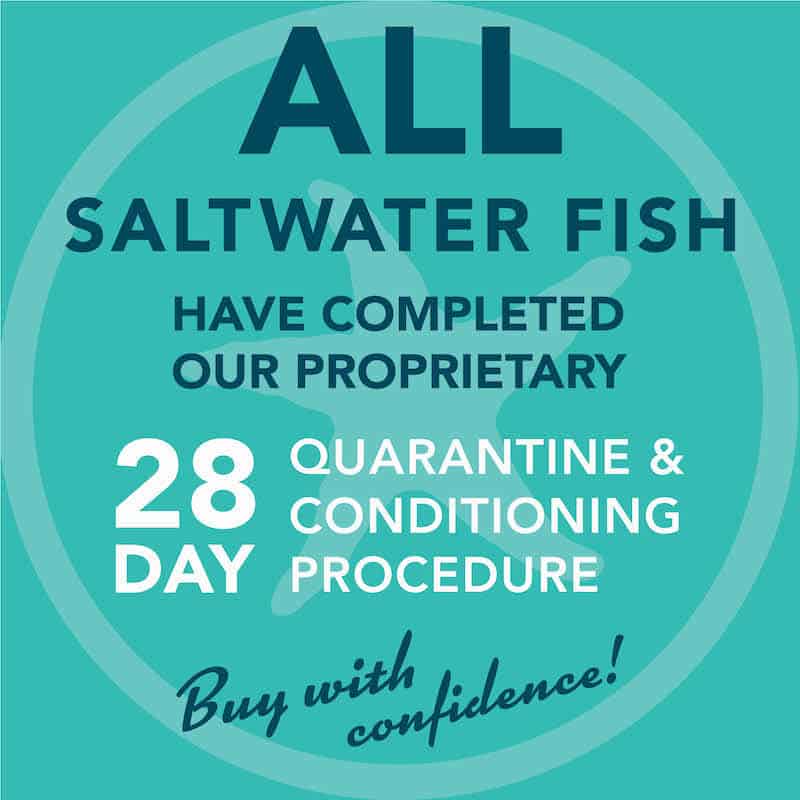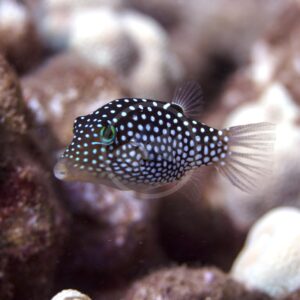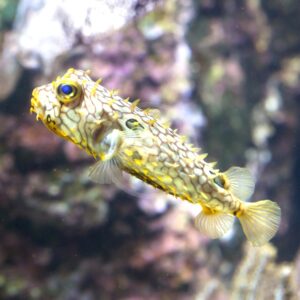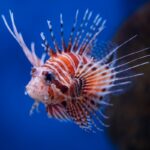

LIONFISH – MOMBASA Pterois mombasae
$139.99
General Description: The Mombasa Lionfish, also known as the African Lionfish or Deep Water Lionfish, are most commonly found in the Indian Ocean. As one of its common names suggests, the Mombasa lionfish can be found at depths up to 130 feet (40 meters) making this species infrequently encountered in the trade as collection of specimens is difficult. Mombasa lionfish are a reddish color with white barring throughout the body. They look very similar to Antennata Lionfish (Pterois antennata), however Mombasa lionfish have shorter pectoral fin filaments, larger eyes and lack dark spots at the base of the pectoral fins. To distinguish from the very common Volitan lionfish (P. volitans), the Mombasa lionfish’s adult size is much smaller (approximately 6″) and the pectoral fins are more fan-like. Lionfish are sensitive to copper based medications. Caution: Mombasa lionfish have a series of venomous spines on their dorsal, pelvic and anal fins that are used in defense. If stung, the sensation is similar to a bee sting but more potent. Remove any part of the spine from the affected area (if applicable) and put the wound underneath the hottest water you can tolerate (not scalding) for 15 – 20 minutes; this breaks down the venom proteins. Then seek the appropriate medical attention. For those that are sensitive to stings, seek medical attention immediately.
*We cannot ship Lionfish species to the state of Florida.
Care Level: Moderate
Temperament: Semi-Aggressive
Reef Compatible: No
General Description: The Mombasa Lionfish, also known as the African Lionfish or Deep Water Lionfish, are most commonly found in the Indian Ocean. As one of its common names suggests, the Mombasa lionfish can be found at depths up to 130 feet (40 meters) making this species infrequently encountered in the trade as collection of specimens is difficult. Mombasa lionfish are a reddish color with white barring throughout the body. They look very similar to Antennata Lionfish (Pterois antennata), however Mombasa lionfish have shorter pectoral fin filaments, larger eyes and lack dark spots at the base of the pectoral fins. To distinguish from the very common Volitan lionfish (P. volitans), the Mombasa lionfish’s adult size is much smaller (approximately 6″) and the pectoral fins are more fan-like. Lionfish are sensitive to copper based medications. Caution: Mombasa lionfish have a series of venomous spines on their dorsal, pelvic and anal fins that are used in defense. If stung, the sensation is similar to a bee sting but more potent. Remove any part of the spine from the affected area (if applicable) and put the wound underneath the hottest water you can tolerate (not scalding) for 15 – 20 minutes; this breaks down the venom proteins. Then seek the appropriate medical attention. For those that are sensitive to stings, seek medical attention immediately.
Diet Requirements: Mombasa lionfish are carnivores. In most cases, lionfish need to be offered live food as a precursor to frozen foods. We recommend giving live ghost shrimp a high quality flake food before feeding them to a lionfish so that they have greater nutritional value. Use a pair of tongs to hold the prey in front of the lionfish so that it begins to associate the tongs with feeding. Some lionfish may turn away or be startled at first, but consistency is key. Once your Mombasa lionfish is interested in frozen foods, appropriate options will vary depending on the size of the individual. Examples include brine shrimp, squid, mysis shrimp, krill, and chopped fish to maintain optimal health and coloration. Because lionfish don’t actively swim throughout the day in the water column, they can be target fed every other day.
Care Requirements: A minimum 75 gallon aquarium is ideal for a Mombasa lionfish. Because they’re a deep water species, Mombasa lionfish appreciate a more dimly lit aquarium or at the very least, some live rock in the aquarium to create caves to hang in during the day. Mixing different lionfish species should be approached with caution. Mombasa lionfish will consume invertebrates and fish small enough to fit in their mouths, making them unsuitable for reef aquariums. Recommended water conditions, 72-78° F, KH 8-12, pH 8.1-8.4, salinity 1.020-1.025.
Purchase Size: Medium: 4″ to 4-1/2″
Note: Your item may not look identical to the image provided due to variation within species. Purchase sizes are approximate.
Dry goods orders are shipped via US Postal Service or UPS to the address provided at checkout based on the selection made in your website shopping cart. Product is carefully packed to help prevent any damage during shipping. Once processed you will receive a shipment notification via email with tracking number, and delivery notification. Please allow 48 hours for processing after your order is placed.
Perishable items (i.e. live plants, refrigerated/frozen foods) are shipped via US Postal Service 2-3 day to the address provided at checkout for a $25.00 flat rate charge. Items are packed with secure packing material and heat, cold, or Cryo packs as needed to maintain safe temperatures during transit. If one or more perishable items are in the shopping cart at checkout the $25.00 perishable shipping charge will automatically appear and need to be selected. Once processed you will receive a shipment notification via email with tracking number. Please allow 48 hours for processing after your order is placed.
Livestock (i.e. fish, invertebrates, coral) are shipped via UPS Overnight to the address provided at checkout for a $55.00 flat rate charge. Livestock is packed in insulated styrofoam boxes with secure packing material and heat, cold, or Cryo packs as needed to maintain safe temperatures during transit. If one or more livestock items are in the shopping cart at checkout the $55.00 livestock shipping charge will automatically appear and need to be selected. Livestock is shipped Monday through Wednesday ONLY (no weekend delivery is available) weather permitting, and we reserve the right to delay shipping until conditions are appropriate for safe arrival. Once your order is placed we will contact you to arrange the best shipping date based on these criteria. Someone must be available to receive the livestock order on the first delivery attempt. Once processed you will receive a shipment notification via email with tracking number. Please allow 48 hours for processing after your order is placed.
For mixed dry goods/perishable & livestock orders items will be shipped via their corresponding shipping methods outlined above. Dry goods will be shipped via US Postal Service or UPS based on your selection and checkout, while livestock will ship via UPS Overnight for a $55.00 flat rate charge. You will receive separate notifications and tracking numbers for the dry goods and livestock. Please note due to different carriers and shipping methods dry goods and livestock may arrive on different days.
Related products
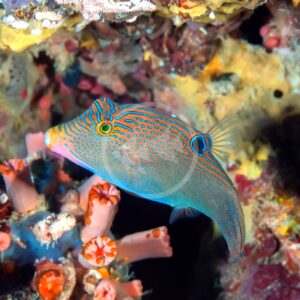

PUFFER – BLUE SPOT Canthigaster solandri
$89.99 – $149.99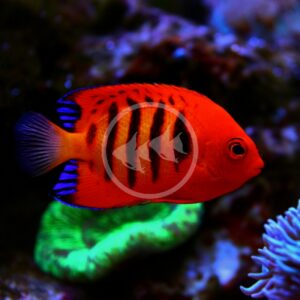

ANGEL DWARF – FLAME Centropyge loriculus
$149.99 – $199.99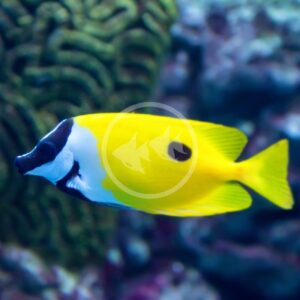

RABBITFISH – ONE SPOT FOXFACE Siganus unimaculatus
$119.99 – $169.99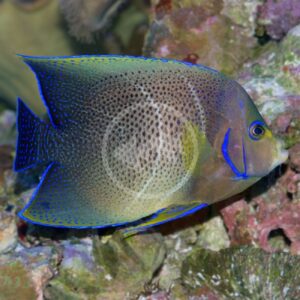
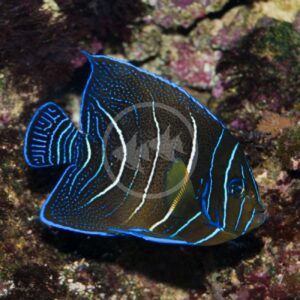
ANGEL – KORAN Pomacanthus semicirculatus
$89.99 – $199.99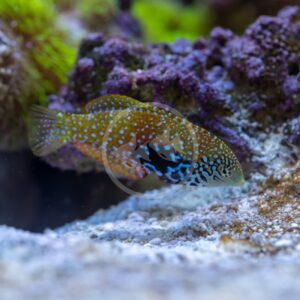

WRASSE – LEOPARD VERMICULATE Macropharyngodon bipartitus
$129.99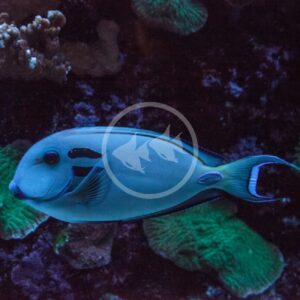

TANG – LIEUTENANT Acanthurus tennenti
$139.99 – $209.99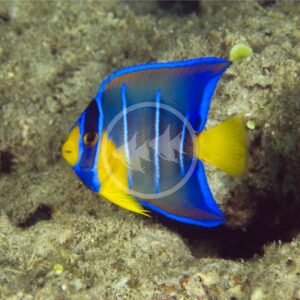

ANGEL – BLUE Holacanthus bermudensis
$349.99